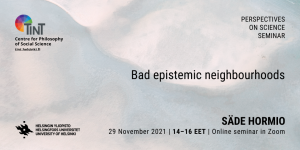
At the next Perspectives on Science seminar on Monday 29.11., Säde Hormio (University of Helsinki) will give a presentation titled “Bad epistemic neighbourhoods”. The seminar takes place in Zoom from 14:15 to 15:45.
Perspectives on Science is a weekly research seminar which brings together experts from science studies and philosophy of science. It is organized by TINT – Centre for Philosophy of Social Science at the University of Helsinki. More information about the seminar here.
To join the seminar, please sign up here.
Abstract:
The epistemic neighbourhoods we are born and live in have a heightened importance when it comes to issues such as climate change, where we have to trust experts. It would be unfair to hold most people blameworthy for their false beliefs regarding climate change given the complexities of climate science and the sophistication of the misinformation machine. Instead of concentrating on culpable individual ignorance, I will suggests that in some cases a more fruitful line of enquiry is to look at who impacts the epistemic community. This will also alleviate concerns about possible responsibility gaps as collective agents can be responsible for an individual’s ignorance through creating misinformation. We can roughly divide the collective agents that have polluted our epistemic neighbourhoods in relation to climate change into those that have done so for ideological reasons (ideological deniers), and those that have done so due to other considerations, such as profit and protecting their bottom line (cynical sceptics), although in practice these conceptual categories can overlap. While the goal of ideological deniers is to make other epistemic agents climate deniers, for the purposes of cynical sceptics, it is enough to create suspending ignorance about climate science at the level of public debate.
Author bio:
Säde Hormio is a Postdoctoral Researcher at Practical Philosophy, University of Helsinki, and part of the TINT research group. Her research focuses on shared and collective responsibility. She is also interested in questions to do with social epistemology, of knowledge and ignorance, and the mechanisms that can cause institutional ignorance, either deliberately or by accident.
